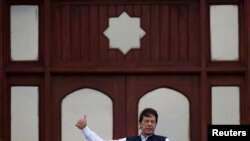ການຮຽກຮ້ອງຂອງນາຍົກລັດຖະມົນຕີປາກິສຖານໃຫ້ຄົນທັງປະເທດສະແດງຄວາມ
ເປັນນ້ຳນຶ່ງໃຈດຽວກັນກັບຊາວແຄັສເມຍ ໂດຍການໄປຢືນຢູ່ນອກເຮືອນ, ຮ້ານຄ້າ
ແລະຫ້ອງການຕ່າງໆຂອງເຂົາເຈົ້າເປັນເວລາ 30 ນາທີ ໃນວັນສຸກວານນີ້ ປາກົດວ່າ
ບໍ່ໄດ້ຮັບການຕອບຮັບຫລາຍປານໃດ. ຫຼາຍຄົນບໍ່ເຊື່ອວ່າ ຈະໄດ້ຮັບຜົນສຳເລັດ
ປານໃດ.
ທ່ານມາລິກ ຕາເຮີ ມາມຸດ, ພໍ່ຄ້າທີ່ຢືນຢູ່ນອກຮ້ານຂອງລາວຢູ່ໃນນະຄອນຫລວງ
ອິສລາມາບັດກ່າວວ່າ “ບໍ່ວ່າສິ່ງໃດກໍຕາມທີ່ເຂົາເຈົ້າເຮັດນັ້ນ ແມ່ນປາດສະຈາກການ
ວາງແຜນ. ການປຸກປັ່ນແບບນີ້ແມ່ນບໍ່ໄດ້ຜົນດອກ. ສາທາລະນະຊົນບໍ່ຄິດດອກວ່າ
ການເຮັດນີ້ຈະຊ່ວຍແຄັສເມຍໄດ້.”
ເມື່ອຖາມວ່າ ລາວຈະອອກຈາກຮ້ານ ແລະໄປຢືນຢູ່ນອກກັບເຈົ້າຂອງຮ້ານຄົນອື່ນໆ
ບໍ່ ທ່ານຊາເວ ກັຕຕັກ ກ່າວວ່າ ລາວຈະເຮັດຄືກັນກັນຄົນອື່ນຢູ່ໃນຕະຫລາດ ແຕ່ກໍໄດ້
ກ່າວເພີ້ມວ່າ ລາວບໍ່ເຂົ້າໃຈກ່ຽກັບການກະທຳເຫລົ່ານີ້ເລີຍ.
ນາຍົກລັດຖະມົນຕີ ທ່ານອິມຣານ ຄານ ໄດ້ປະກາດມາດຕະການທີ່ຈະຄັດຄ້ານອິນເດຍທີ່ໄດ້ເຮັດໃຫ້ຖານະພິເສດຂອງແຄັສເມຍທີ່ເປັນສ່ວນຢູ່ພາຍໃຕ້ການຄວບຄຸມ
ຂອງຕົນນັ້ນໝົດໄປ- ກີດກັ້ນບໍ່ໃຫ້ຂົງເຂດດັ່ງກ່າວມີສິດໃນການປົກຄອງຕົນເອງທີ່
ເຄີຍມີໃນອະດີດນັ້ນ. ເພື່ອຫລີກຫລ່ຽງການຕອບໂຕ້ຄືນຈາກປະຊາຊົນໃນທ້ອງຖິ່ນ
ລັດຖະບານອິນເດຍໄດ້ສົ່ງພະນັກງານຮັກສາຄວາມປອດໄພຫຼາຍ ພັນຄົນໄປເພີ້ມ,
ປະກາດການບໍ່ໃຫ້ຄົນອອກນອກບ້ານເກີນເວລາກຳນົດໃຫ້, ງົດການໃຊ້ໂທລະສັບ
ແລະປິດບັນດາຊ້ອງໂທລະພາບຕ່າງໆລົງ, ທຳການຕັດຂົງເຂດດັ່ງກ່າວຈາກໂລກ
ພາຍນອກໄດ້ຢ່າງມີປະສິດທິຜົນ.
ທ່ານຄານກ່າວໃນວັນສຸກວານນີ້ວ່າ ການປະທ້ວງໃນວັນສຸກວານນີ້ ຈະຊ່ວຍເຮັດ
ໃຫ້ການລາຍງານຂອງສື່ມວນຊົນສາກົນ ແລະນຳເອົາບັນຫາຂອງແຄັສເມຍເຂົ້າມາ
ເປັນຈຸດສົນໃຈຂອງຄົນ.
ເພື່ອພະຍາຍາມເຮັດໃຫ້ເຫດການດັ່ງກ່າວສຳເລັດ ຊັບພະຍາກອນສຳຄັນຂອງລັດ
ຖະບານໄດ້ຖືກເອົາມາໃຊ້. ບັນດາພະນັກງານຢູ່ໃນກະຊວງຕ່າງໆຂອງລັດຖະບານ
ຖືກບອກໃຫ້ ໄປປາກົດໂຕຟັງການກ່າວຄຳປາໃສຂອງທ່ານ ຢູ່ຫ້ອງການເລຂາຂອງ
ນາຍົກລັດຖະມົນຕີ. ພວກນັກຮຽນຈາກໂຮງຮຽນຫຼວງໄດ້ຖືກນຳພາໄປຢູ່ຂ້າງຖະໜົນ
ໂດຍມີທຸງຖືຢູ່ໃນມື.
ບັນດາຊ້ອງໂທລະພາບທ້ອງຖິ່ນ ທັງຂອງລັດ ແລະເອກະຊົນ ໄດ້ສັ່ງໃຫ້ອອກລາຍ
ການກ່ຽວກັບແຄສເມຍ ພ້ອມທັງສະແດງສັນຍາລັກຢູ່ໜ້າຈໍໂທລະພາບຂອງເຂົາເຈົ້າ
ທີ່ອ່ານວ່າ “ແຄັສເມຍຈະກາຍມາເປັນຂອງປາກິສຖານ.”
Pakistani prime minister's call for the country to show solidarity with Kashmiris by standing outside their homes, shops, and offices for 30 minutes Friday seemed to receive a lackluster response. Many questioned its efficacy.
"Whatever they're doing is without any planning. This kind of agitation is not effective. The public doesn't think this will help Kashmir," said trader Malik Tahir Mahmood standing outside his shop in capital Islamabad.
When asked whether he will leave his shop and stand outside, another shopkeeper Shahwez Khattak said he will follow what others in the market do but added that he did not understand these actions.
Prime Minister Imran Khan had announced the measure to protest India stripping the part of Kashmir under its control of its special status—depriving the region of hitherto granted autonomy. To avoid retaliation from the local population, the Indian government deployed thousands of additional security personnel, announced a curfew, suspended all phone service, and shut down television channels, effectively cutting off the region from the rest of the world.
Pakistan, which claims ownership of the disputed territory, responded by ousting the Indian high commissioner and partially cutting trade and transport links with India.
Khan said Friday's protests would help generate international media coverage and bring Kashmir's issue into focus.
To try to make the event a success, significant government resources were used. Employees in many government departments were told to show up to the prime minister's secretariat to listen to his speech. Students from government schools were led to road sides, small flags in hand.
Local TV channels, public and private, were ordered to run Kashmir related programs as well as display a logo on their screens reading "Kashmir will become Pakistan."
No flights were to take off during the 30 minutes starting at noon local time, and all trains were to stop for a minute at noon. All traffic lights were to turn red for half an hour. At exactly 12, national anthems of both Pakistan and Kashmir were to be played on most TV and radio channels.
However, the participation from the public seemed mostly forced, rather than voluntary.
In capital Islamabad, where shops normally start closing around noon for Friday prayers, many decided to close early. Traffic flow was normal and other than a few cars here and there, no one stopped at noon until traffic police blocked all intersections and forced people to wait for 30 minutes.
At one such intersection, a VOA team recorded people arguing with the traffic police.
Still, some people agreed with the PM's step.
"The whole world will watch us and realize Kashmir's issue is real," said real estate broker Chaudhry Azhar.
Another man, Abu Bakr Chawla, said any actions that avoided conflict were good.
"We don't want war. We want things to be resolved peacefully," he said.
The nationwide demonstrations are supposed to take place weekly until September 27, when the PM will address the United Nations General Assembly.





